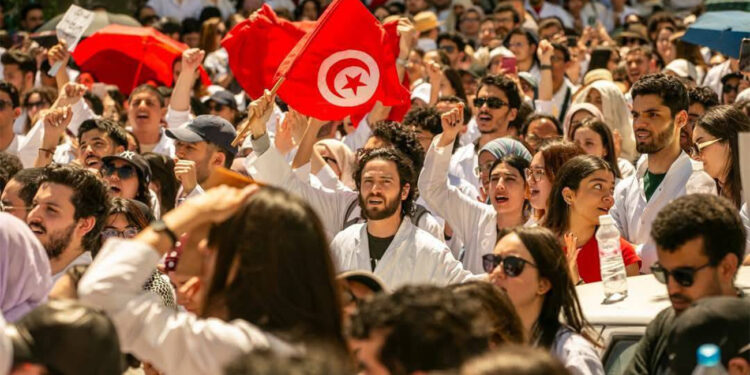In its latest semi -annual report, the Tunisian forum for economic and social rights (FTDES) alerts to an explosion of protest movements in Tunisia, up more than 100% compared to last year. The document also highlights a disturbing increase in violence, cases of suicide and the climate of social tension.
The report of the first half of 2025 published by the Tunisian Social Observatory (OST), attached to the FTDES reveals that between January and June, the country recorded 2,387 protest movements, against 1161 during the same period in 2024, a spectacular increase of 105.6%.
Professional and union demands constitute the majority of mobilizations, with requests on the regularization of professional situations, the right to hire, the payment of wages and bonuses, or the implementation of social agreements that have remained a dead letter, in particular in the precarious education and employment sectors. According to the OST, these protests have represented more than half of the actions identified.
The monthly distribution shows a relatively stable rhythm of protests:
- January: 483 movements
- February: 432
- March: 217
- April: 422
- May: 451
- June: 379
Tunis remains the most agitated governorate, concentrating approximately 25% of the demonstrations. It is followed by Kairouan (161 movements), Tozeur (147), Gafsa (138), Sidi Bouzid (107) and Nabeul (102).
The report is not limited to mobilizations. It also lists 65 cases or attempts at suicide, mainly affecting young active young people and adults (70%), but also 17 children and 3 elderly people. The OST points to a direct link with poverty, unemployment and degraded living conditions.
In addition, the past semester has seen a continuous increase in acts of violence, whether individual, collective, institutional or symbolic. Crime constitutes the majority of reported incidents, with an increase in murder attempts, assaults, rapes, theft and school violence, the latter sometimes targeting teachers and families.
Men are mainly involved in violence, often motivated by despair, frustration or intimidation, with the privileged victims of women and children. Public space, including streets, hospitals, schools and transport, remains the main theater of this violence.
Added to this is a rise in cyberviolence, often relayed or trivialized in certain political or media speeches.
Faced with this critical situation, the Tunisian social observatory urges the authorities to adopt scientific approaches to combat violence and social discomfort. He calls for strengthening education for citizenship and non-violence, to develop early intervention mechanisms in school and family circles, and to rethink social and economic policies in depth.








